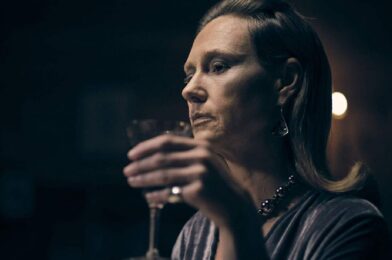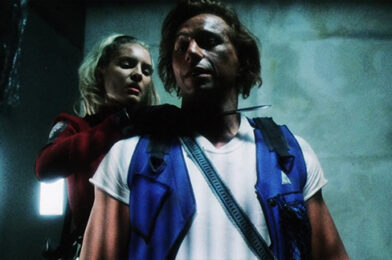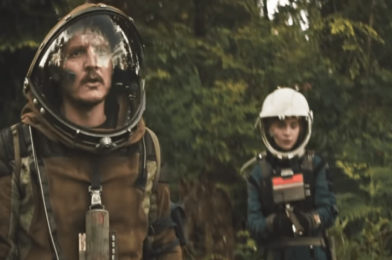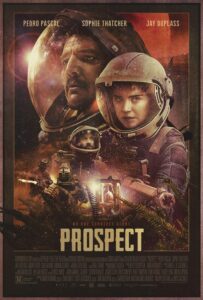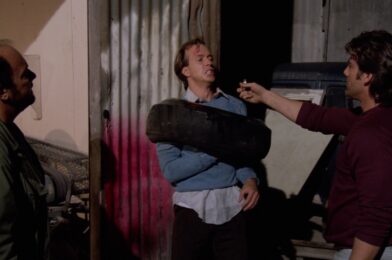Climate of the Hunter (2019) – A Movie A Day 2021 #25
Climate of the Hunter (2019) – A Movie A Day 2021 #25

I was looking for another newly released horror movie to watch when I came across the trailer for Climate of the Hunter, and it intrigued me the most out of the handful of new horror movies released this month. With its strong 1970s vibes, its fullscreen/1.33 aspect ratio, and its promise of some arthouse indie weirdness with vampires, the trailer sold me on a VOD rental. After watching Climate of the Hunter I would debate its categorization as a horror movie, but it did turn out to be an enjoyably quirky and darkly comedic psychological thriller.
So what is Climate of the Hunter about? That might be difficult to pin that down exactly, but I’ll give it shot. A large part of the movie is about family. The story focuses on sisters Alma (Ginger Gilmartin) and Elizabeth (Mary Buss) and their strained relationship. The sisters are staying together in a vacation cabin owned by their family, and the two of them range from passive aggressive to downright hostile in their interactions throughout the film. Their relationship is further tested when a charming and worldly writer named Wesley (Ben Hall) comes to stay in the cabin next door. Alma and Elizabeth are both attracted to Wesley, and Wesley is content to accept affections from them both which, of course, exacerbates their sibling rivalry.
Through multiple dinner conversations (usually involving immaculately prepared 1970s-era dinners, the contents of which are narrated to us, the audience) we learn that Wesley has his own struggles with family, specifically his wife who was recently committed to a mental institution and his son who blames Wesley for his mother’s condition. Add to all of this the fact that Alma’s daughter Rose visits after being somewhat estranged from her mother for years, and you have all the makings of a tense family drama.
Climate of the Hunter is also about mental instability. The very first thing we see in the movie is a typed report describing the mental condition of one of the characters. The prognosis isn’t good, and with delusions, psychotic episodes, and more being planted in our brains right away, it sets us up to expect a difficult time for the people we’re soon to meet. So in a way, Climate of the Hunter is about experiencing the mental decline of one of our main characters. But with the way the story is told, there is a lot of room for us to wonder if that character is sane and has just been put in an insane situation. Why? Because Wesley might be a vampire.
Now don’t worry, that’s not a spoiler. We see vampiric images in the trailer, and every writeup for the movie explicitly states that Wesley might or might not be a vampire. Throughout the many conversations, hints are dropped about his possible blood-sucking proclivities. We also see certain things that would make us believe he is, in fact, a vampire, but there is still some doubt because of how the movie is constructed.
There is a lyrical nature to many scenes throughout Climate of the Hunter. Wesley has an eloquent way of speaking even when he’s talking about some of the most crude things imaginable. Also, Wesley likes to talk a lot. I’ve already mentioned the conversations in the movie a few times, and that’s because most of the movie is centered on long conversations with highly stylized dialogue. The dialogue and deliveries from the actors give the movie a sense of a heightened reality, and that leads into the visuals. Stars shine brighter than they should, lights appear where they shouldn’t, thoughts are represented visually, and dreams blend with reality. Visuals like that aren’t used excessively, but they’re used often enough to keep the audience a bit off balance. But is what we’re seeing simply meant to evoke certain emotions, of are we sharing the delusions of one or more of the characters? Or maybe both? No clear answers are given, and your willingness to accept ambiguity is going to be one of the deciding factors for if you will enjoy Climate of the Hunter or not.
I enjoyed Climate of the Hunter, but it’s definitely going to be an acquired taste for many people. It’s quirky in ways that reminded me slightly of a dark, alternate-universe version of a Wes Anderson movie. Maybe I kept thinking of Wes Anderson because of how the movie is shot (very symmetrical, straight-on shots of characters, quick zooms, etc.), but I do think it’s a valid comparison as far as the aesthetic goes. And really, the 1970s aesthetic is one of the things I really love about the movie. It’s convincing in a way that most modern filmmakers just can’t pull off.
The comedy in Climate of the Hunter is dark, and for the most part it’s very, very dry. It’s more of a smirking movie than a laugh out loud movie, though I did chuckle a few times when a situation caught me off guard. The biggest takeaway as far as a recommendation goes is that the movie is dialogue-heavy. If you enjoy a talky indie movie that gets weird and slightly uncomfortable, then Climate of the Hunter might be for you.
You know, the more I think about it as I’m writing this, the more I’m finding to love about the movie. My initial reaction when finishing it was, “yeah, that was fun,” but now I kind of want to watch it again. I’m sure I will at some point.
So did I answer my question from earlier? What is Climate of the Hunter about? On the surface, it’s not about much. The characters’ fates seem as inevitable as the typed mental report shown to us at the beginning of the film. It’s about a brief moment in the lives of a handful of people whose personal problems begin to become each other’s problems as they discuss life and philosophy over some colorful and not-terribly-appetizing food. But is it about vampires? Maybe.
